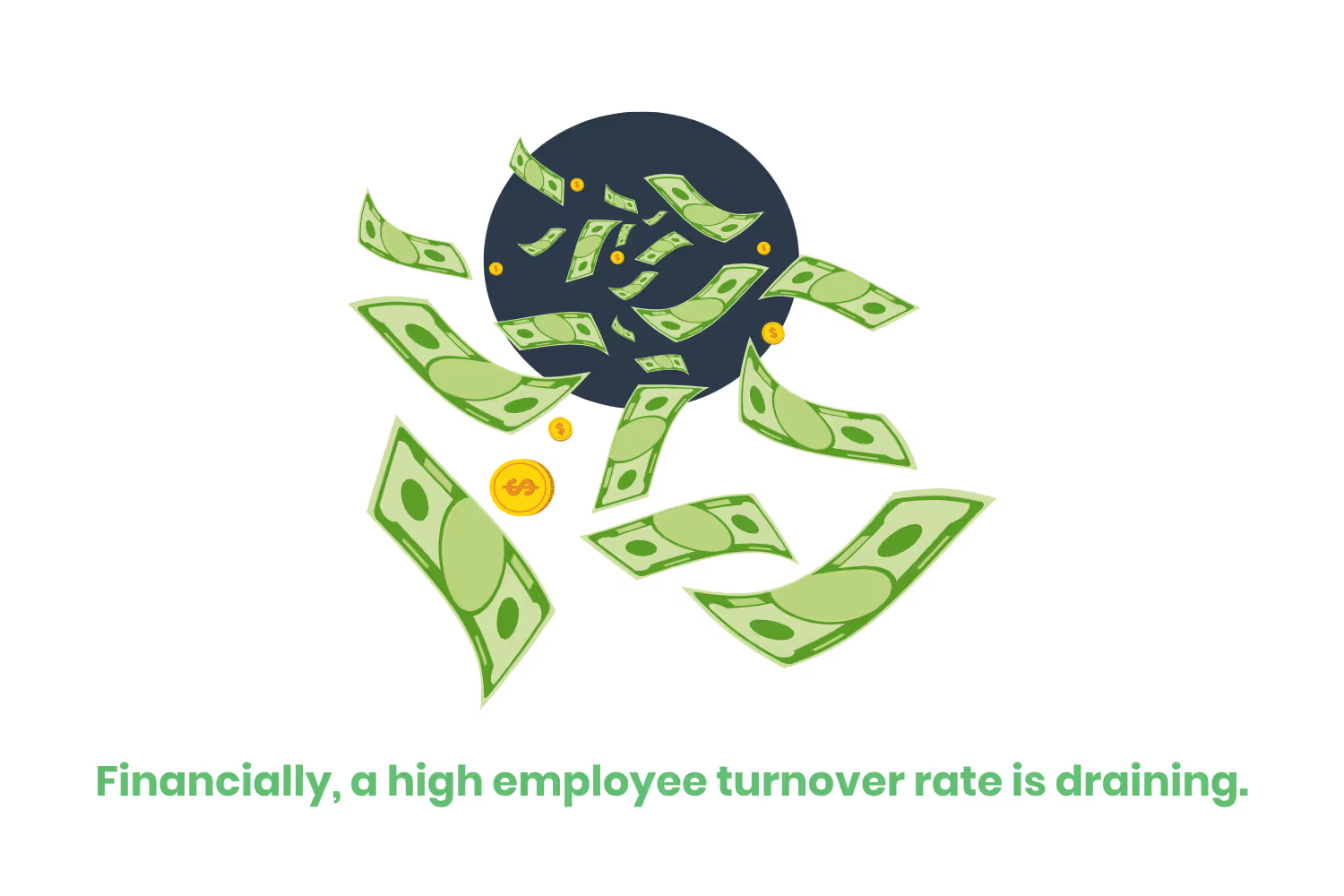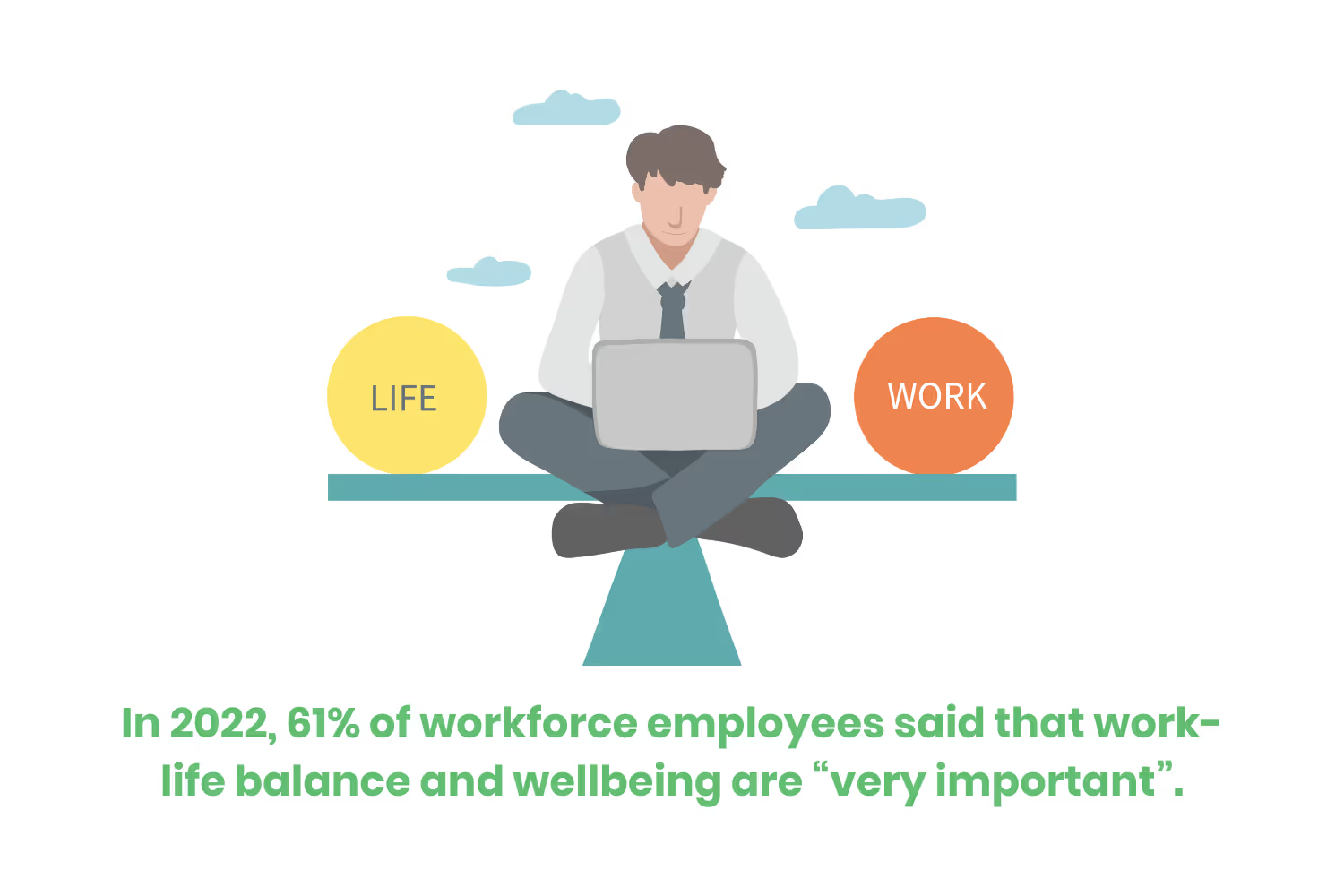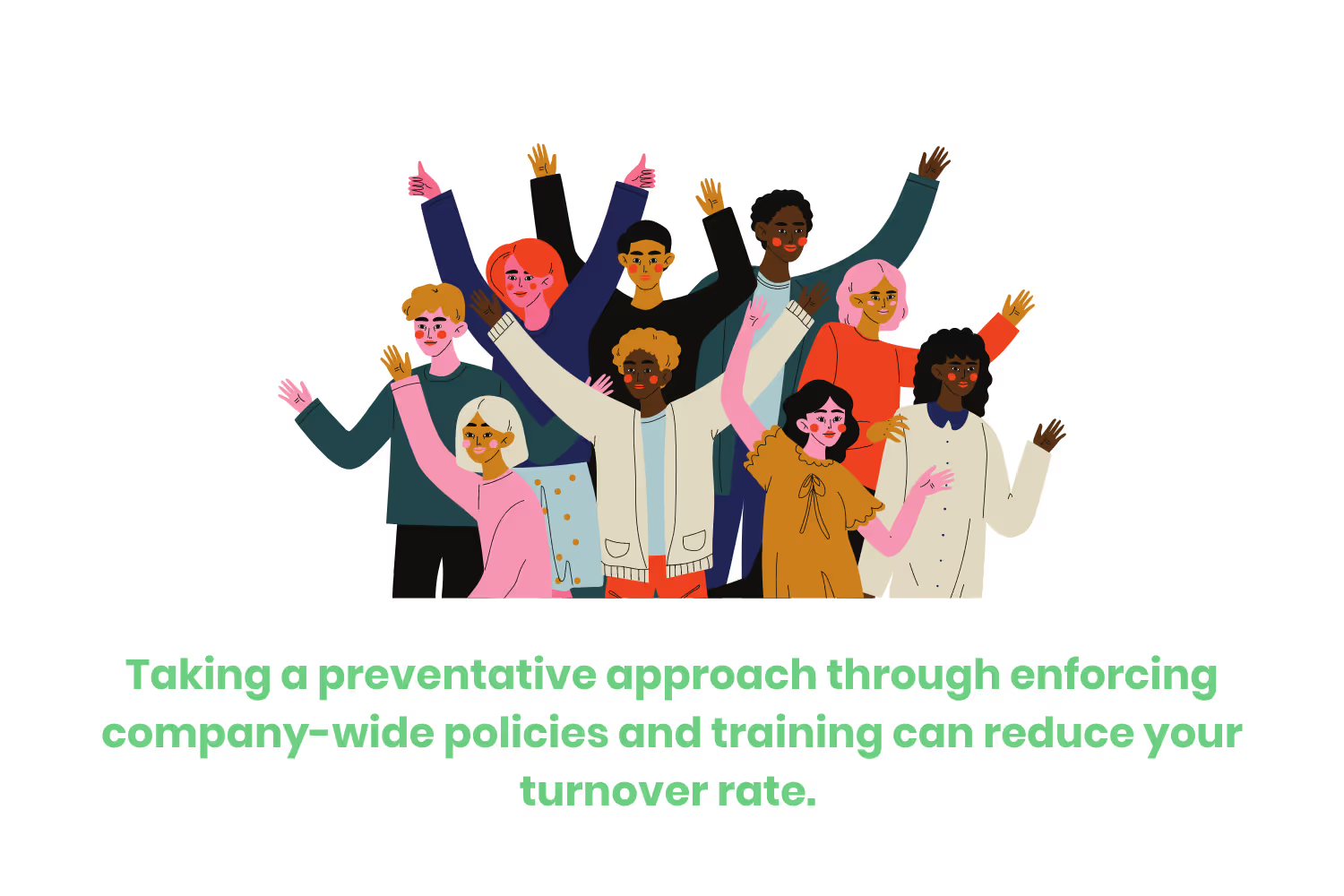60+ Employee Retention Survey Questions
Let’s get into the what, why and how. We will discuss what an employee retention survey is and why reducing turnover is so important. We will also look at 60 example questions that you can incorporate into your very own survey.

Did you know that as of 2024, 48% of U.S. employees are open to leaving their current job? That’s nearly half of the workforce! As we can see from this statistic, employee turnover is a genuine threat that all employers face daily. This means that simply finding and recruiting top talent for your company is not enough. Making sure you can retain good employees and maintain a healthy work environment is an ongoing project.

One of the most popular ways to gauge employee satisfaction in an organization is by offering regular surveys. These employee retention surveys allow employees to share their thoughts on different aspects of the organization anonymously. Employers can then use this information to adjust workplace culture and environment as needed to accommodate their team.
Employee retention surveys are a key tool when it comes to reducing organizational attrition. Today, let’s get into the what, why and how. We will discuss what an employee retention survey is and why reducing turnover is so important. We will also look at 60 example questions that you can incorporate into your very own survey.
Why Does Employee Retention Matter?
Tracking your employee retention rate is a pinnacle when it comes to running a successful business. After all, how do you expect to succeed and grow in business opportunities and revenue if you don’t have the right people in the right places? Unfortunately, you can’t do it all.
Avoid constantly needing to spend time, money and resources training new hires because your employee turnover rate is too high. Instead, you should be developing your current team to be efficient and productive long-term employees. Strengthening your company’s foundation through dedicated and loyal talent can allow you to grow your business more rapidly.
Financially, a high employee turnover rate is draining. As I mentioned, spending money to onboard and train new employees is detrimental when you’re doing it every few months. Also, higher-retention companies can take advantage of internal mobility. Promoting workers from within the company to different positions can lower the cost of training and development.

Employee Retention Survey
So, with all of this information in mind, you can imagine that feedback from the employees themselves is very important. It can be difficult to get a feel for the day-to-day happenings around the office, as you can’t be everywhere at once.
You also have your job to do! And even if you did walk up to someone to ask how they are doing, your employee might not answer truthfully so as not to upset you. That’s where the anonymity of an employee retention survey comes into play.
When creating your survey, carefully crafting your questions is the first step. Your goal is to retain employees, so make sure you are asking the appropriate questions. Here are some template questions for you to choose from when creating your survey.
Job Satistfaction
- In your current job role, how satisfied do you currently feel?
- Would you describe your job as challenging and interesting?
- Do you feel your company values the work you do?
- Would you describe your daily workload as reasonable?
- Do you feel you have a good level of autonomy within your job?
- Do you feel fulfilled by the day-to-day tasks that come with your job?
Career Development
- When it comes to your career growth, do you feel there is an opportunity for you here?
- Are you satisfied with the training opportunities provided?
- Do you have career goals within the company?
- Are you receiving regular feedback on your performance?
- Are you satisfied with the company's support of your professional development?
- Do you think the company offers sufficient opportunities for growth and promotion?

Compensation and Benefits
- Are you satisfied with your current salary?
- Do you feel the company’s benefits package meets your needs?
- How satisfied are you with the company’s health insurance benefits?
- Do you feel that your compensation reflects your job performance?
- Do you feel the company offers adequate retirement plan options?
- Do you think the company offers sufficient paid time off?
Work Environment
- Are you satisfied with your physical work environment?
- Do you feel your workplace is a safe space?
- Do you have the necessary resources to perform your job well?
- Do you feel the communication within your team and from leadership is sufficient?
- Do you think that the company culture aligns with your personal values?
- How satisfied are you with the company activities and events outside of the workplace?

Management and Leadership
- Are you satisfied with the amount of support from your direct manager?
- Do you think that your manager communicates their expectations to the team with clarity?
- Would you describe professional feedback from your manager as constructive?
- Do you feel like your manager values and respects your opinions/ideas?
- Would you say that you trust the leadership team of the company?
- Are you satisfied with the direction the company is going?
Company Policies and Procedures
- Regarding the company’s policies, do you feel they are fair?
- Do you feel that the company’s policies on diversity and inclusion are up to standard?
- How do you feel the company handles conflict between team members?
- Would you say the company’s disciplinary policy is fair?
- Do you feel the company’s policies on overtime and work hours are fair?
- Do you think that the company’s onboarding process for new employees is satisfactory?
Team Dynamic
- Are you happy with the level of collaboration within your team?
- Do you feel you receive enough support from your colleagues?
- Do you think the way that conflicts get resolved on your team is adequate?
- Do you think your team members value your opinions and ideas?
- When it comes to the division of work amongst your team, do you feel it is fairly distributed?
- Do you feel that your team regularly meets goals and deadlines?
Engagement and Motivation
- Do you feel motivated to do your best when you come to work?
- Are you satisfied with the level of engagement in your job?
- Do the company’s missions and values motivate you?
- With the current recognition programs in place, how satisfied are you?
- Do you feel you bring positive contributions to the company?
- Are you happy with the company’s involvement to keep you engaged?

Work-Life Balance
- When it comes to both your personal life and your work life, do you feel like there is a good balance?
- Do you feel comfortable asking to take time off if you need it?
- Does the amount of work you are responsible for feel overwhelming?
- Do you often feel overwhelmed by your workload?
- Are you satisfied with your company’s mental health support programs?
- Do you feel like you can share any work-life balance issues you may have with your supervisor?
Retention and Commitment
- Would you recommend this company as a great place to work?
- Do you feel a sense of loyalty to the company?
- Do you feel satisfied with the overall experience at this company?
- How much time do you think the company commits to improving employee satisfaction?
- Do you think the company’s efforts to retain employees is satisfactory?
- When it comes to your concerns, do you feel the company addresses them effectively?
Conclusion
Incorporating these retention surveys alone is not enough to keep your employees from leaving. You must acknowledge their responses and then act accordingly. Simply sending out the survey and not accommodating (for reasonable requests) will fix nothing.
Here’s an example. In 2022, 61% of workforce employees said that work-life balance and well-being are “very important”. The same survey reports that 42% said it was important to them that their company is diverse and inclusive of all types of people. Employees want to feel safe in their work environment in all aspects. Mentally, physically, and emotionally. So consider enforcing thorough diversity and sexual harassment training.
Taking a preventative approach to issues through enforcing company-wide policies and training is another way to reduce your turnover rate. Fostering this sense of security will only improve employee satisfaction and strengthen loyalty. Cultivating a positive work culture for your employees to feel a sense of belonging and support, through training and regular surveys, will only help you grow your business in the long run.
Emphasize your product's unique features or benefits to differentiate it from competitors
In nec dictum adipiscing pharetra enim etiam scelerisque dolor purus ipsum egestas cursus vulputate arcu egestas ut eu sed mollis consectetur mattis pharetra curabitur et maecenas in mattis fames consectetur ipsum quis risus mauris aliquam ornare nisl purus at ipsum nulla accumsan consectetur vestibulum suspendisse aliquam condimentum scelerisque lacinia pellentesque vestibulum condimentum turpis ligula pharetra dictum sapien facilisis sapien at sagittis et cursus congue.
- Pharetra curabitur et maecenas in mattis fames consectetur ipsum quis risus.
- Justo urna nisi auctor consequat consectetur dolor lectus blandit.
- Eget egestas volutpat lacinia vestibulum vitae mattis hendrerit.
- Ornare elit odio tellus orci bibendum dictum id sem congue enim amet diam.
Incorporate statistics or specific numbers to highlight the effectiveness or popularity of your offering
Convallis pellentesque ullamcorper sapien sed tristique fermentum proin amet quam tincidunt feugiat vitae neque quisque odio ut pellentesque ac mauris eget lectus. Pretium arcu turpis lacus sapien sit at eu sapien duis magna nunc nibh nam non ut nibh ultrices ultrices elementum egestas enim nisl sed cursus pellentesque sit dignissim enim euismod sit et convallis sed pelis viverra quam at nisl sit pharetra enim nisl nec vestibulum posuere in volutpat sed blandit neque risus.

Use time-sensitive language to encourage immediate action, such as "Limited Time Offer
Feugiat vitae neque quisque odio ut pellentesque ac mauris eget lectus. Pretium arcu turpis lacus sapien sit at eu sapien duis magna nunc nibh nam non ut nibh ultrices ultrices elementum egestas enim nisl sed cursus pellentesque sit dignissim enim euismod sit et convallis sed pelis viverra quam at nisl sit pharetra enim nisl nec vestibulum posuere in volutpat sed blandit neque risus.
- Pharetra curabitur et maecenas in mattis fames consectetur ipsum quis risus.
- Justo urna nisi auctor consequat consectetur dolor lectus blandit.
- Eget egestas volutpat lacinia vestibulum vitae mattis hendrerit.
- Ornare elit odio tellus orci bibendum dictum id sem congue enim amet diam.
Address customer pain points directly by showing how your product solves their problems
Feugiat vitae neque quisque odio ut pellentesque ac mauris eget lectus. Pretium arcu turpis lacus sapien sit at eu sapien duis magna nunc nibh nam non ut nibh ultrices ultrices elementum egestas enim nisl sed cursus pellentesque sit dignissim enim euismod sit et convallis sed pelis viverra quam at nisl sit pharetra enim nisl nec vestibulum posuere in volutpat sed blandit neque risus.
Vel etiam vel amet aenean eget in habitasse nunc duis tellus sem turpis risus aliquam ac volutpat tellus eu faucibus ullamcorper.
Tailor titles to your ideal customer segment using phrases like "Designed for Busy Professionals
Sed pretium id nibh id sit felis vitae volutpat volutpat adipiscing at sodales neque lectus mi phasellus commodo at elit suspendisse ornare faucibus lectus purus viverra in nec aliquet commodo et sed sed nisi tempor mi pellentesque arcu viverra pretium duis enim vulputate dignissim etiam ultrices vitae neque urna proin nibh diam turpis augue lacus.




